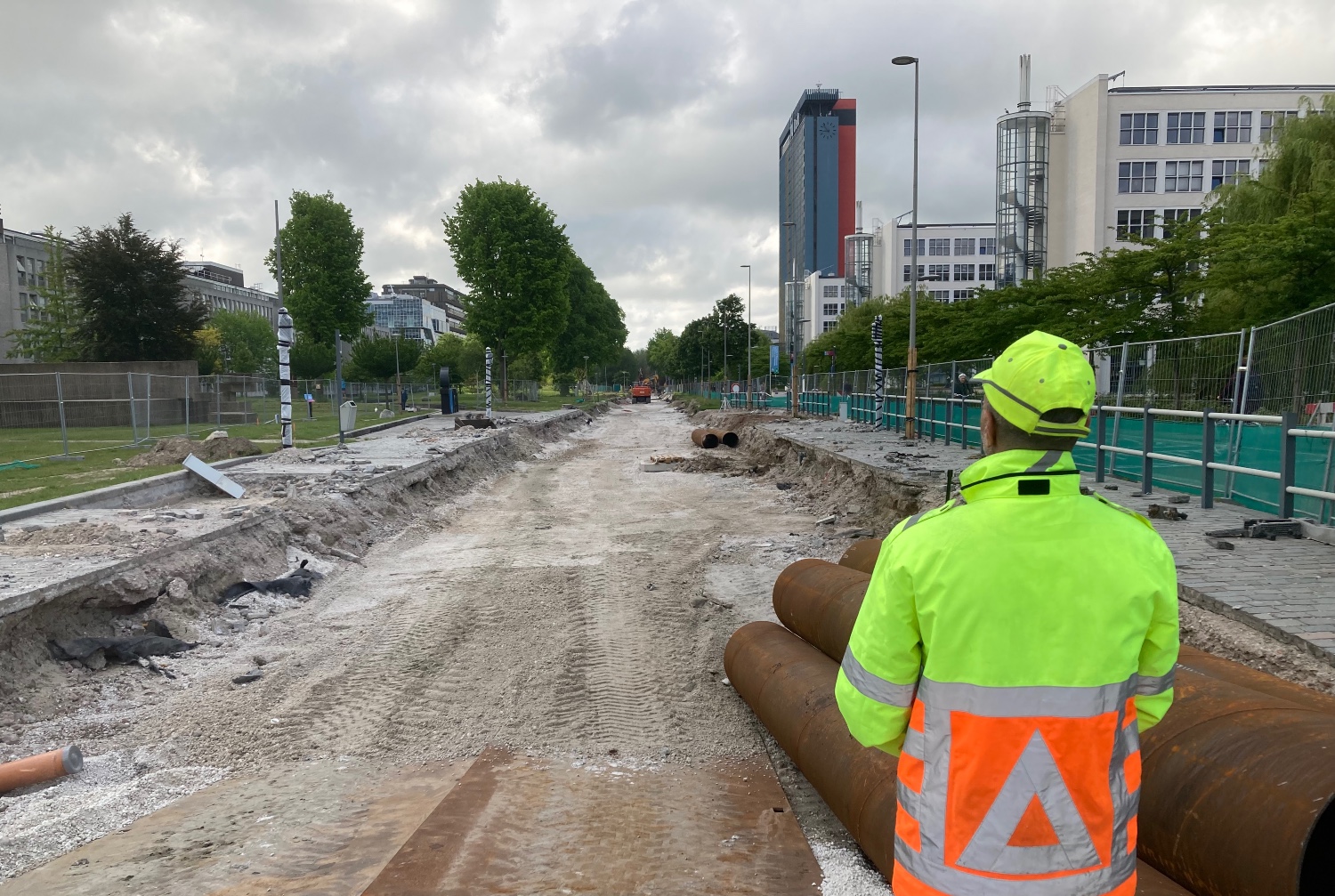Following a motion of censure from the Delft City Council on tram 19’s timetable, the Metropolitan Region is now looking at ‘options for additional transport’.
Twenty years after the initial plan, the world's most low-fault tramway is under construction across campus. (Photo: Jos Wassink)
It should finally start in early 2024: tram line 19 will run across campus. Yet after many problems, the final hurdle has still not been cleared, as Metropoolregio Rotterdam Den Haag (MRDH) announces it is looking at additions to the planned timetable.
This is because the tram will only operate on weekdays between 07:00 and 19:00. Eelco de Vries, spokesperson campus real estate and facilities management (CREFM) at TU Delft, confirms that this is stipulated in the implementation agreement between MRDH and TU Delft. This was chosen “based on input from municipalities and other stakeholders”, De Vries writes.
Disapproval
The restricted timetable led to widespread disapproval in the municipal council on 16 May. In a unanimously supported motion of censure, the city council asked the municipal executive to convey its displeasure to the boards of TU Delft and MRDH. The municipal council felt that these parties should renegotiate to allow the tram to also run in evenings, weekends and during school holidays.
“This timetable means that the campus will soon be even less accessible by tram than before when there were buses,” says Works Council (OR) member Herman de Wolff. It was at the joint OR and Student Council meeting with the Executive Board on 11 May 2023 that he first heard about the limited timetable. Two weeks later, the Works Council (OR) wrote on the intranet that ‘the last word’ has not yet been said on the subject. ‘For the or, there must be good public transport on campus. Also in the evening. And also at weekends. First and foremost for students and staff. And: the tram is also very important for people who live along the route.’
So why was it chosen anyway? De Vries replies by email (30 May 2023): ‘because it allows TU Delft to conduct studies in the evening hours and at night whose sensitivity to vibrations and electromagnetic fields is too high for tram use during that time period.’
This is a strange statement because the very reason that no cost and effort were spared was to minimise vibrations and magnetic fields. “You won’t find a tram track like this anywhere,” Project Manager Dick Huybens had previously said in Delta. Have all these innovations now been for nothing?
Wrong track
‘I am also very surprised by that argument,’ e-mails Pieter Kruit about the restriction related to vibrations and electromagnetic fields. Together with Dick van Bekkum (EM power systems), he is the architect of the EMRS 2 electromagnetic reduction system with which the tramline will be equipped. ‘Surely they could have at least waited a while to see whether it works or not,’ Kruit writes about the curtailment of the timetable.
As Kruit and Van Bekkum cannot place the interference argument, they suspect other motives. Van Bekkum suggests: ‘MRDH has looked at (what in the transport world is called) transport value. How many people do they expect to serve with a particular timetable. And that then leads to decisions about when to ride/not ride.’
Van Bekkum does have a point there. Monique de Jong, communications consultant at MRDH writes: ‘At the start of the project, it was assumed that tram line 19 would operate on weekdays between 7 am and 7 pm; this is based on the expected number of passengers. It is expected that after 7pm there will not be enough passengers to run a profitable tram operation.’
In response to the motion of censure, De Vries wrote that ‘MRDH is investigating possibilities for additional transport after 19:00’. Whether buses will then run over the tram line again MRDH cannot yet say: ‘In what way additional transport will be provided is still being investigated.’ The timetables of the adjacent bus lines over Schoemakerstraat (55) and Rotterdamseweg (40) are independent of tram line 19’s timetable, MRDH explains when asked.
Do you have a question or comment about this article?
j.w.wassink@tudelft.nl


Comments are closed.